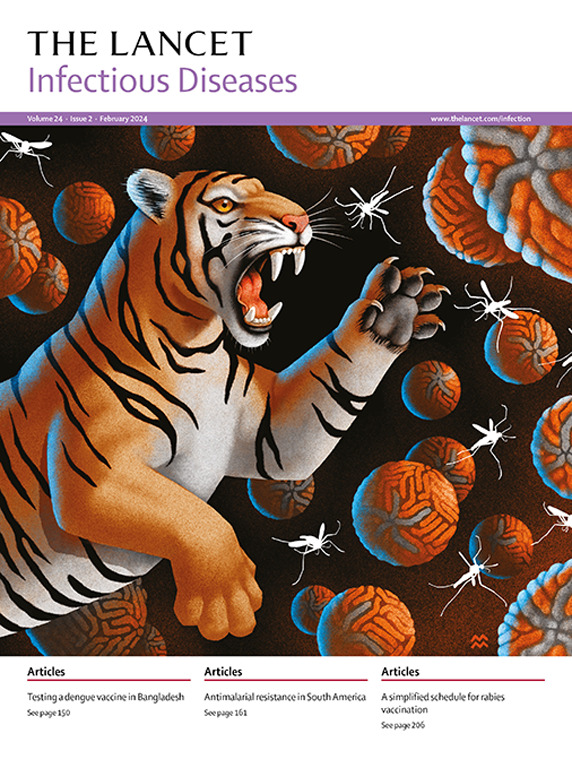阿根廷2024年RSV流行季期间,妊娠期RSV预接种疫苗对导致婴儿住院的RSV相关下呼吸道疾病的实际有效性(BERNI研究):一项多中心、回顾性、检测阴性、病例对照研究
IF 36.4
1区 医学
Q1 INFECTIOUS DISEASES
引用次数: 0
摘要
2024年3月,阿根廷成为第一个将二价呼吸道合胞病毒(RSV)预融合F疫苗(RSVpreF)作为预防婴儿RSV疾病的主要战略实施国家孕产妇免疫规划的国家。我们的目的是评估疫苗对rsv相关下呼吸道疾病(LRTD)和导致婴儿在实施后第一个季节住院的严重LRTD的有效性。方法对阿根廷12家医院在2024年RSV流行季节进行多中心、回顾性、检测阴性、病例对照研究(BERNI研究)。我们纳入了2024年4月1日至9月30日期间因LRTD住院的6个月或更小的婴儿,并使用PCR或间接免疫荧光检测RSV;病例为呼吸道合胞病毒检测呈阳性的婴儿,对照组经聚合酶链反应证实为呼吸道合胞病毒阴性。如果接种了RSVpreF疫苗的孕妇在妊娠32+0/7周至36+6/7周和分娩前14天或更长时间接种了RSVpreF疫苗,则认为婴儿出生。我们使用多水平logistic回归对潜在混杂因素进行校正,通过比较怀孕期间婴儿病例与对照组的RSVpreF疫苗接种的几率,估计疫苗对需要住院治疗的rsv相关LRTD(主要结局)和需要住院治疗的rsv相关严重LRTD(关键次要结局)的有效性。在2024年4月1日至9月30日期间因LRTD住院的633名婴儿中,505例(286例,219例对照)完全符合纳入初级疫苗有效性分析的资格标准;51例(18%)病例和109例(50%)对照生自妊娠期接种RSVpreF的个体。从出生到3个月龄,针对rsv相关LRTD导致的婴儿住院的疫苗有效性为78.6% (95% CI为62.1 - 87.9),从出生到6个月龄的疫苗有效性为71.3%(53.3 - 82.3)。从出生到6个月,对与rsv相关的导致住院的严重LRTD的有效性为76.9%(45.0 - 97.3%)。发生了3例与rsv相关的院内死亡,全部发生在母亲在怀孕期间未接受RSVpreF治疗的婴儿中。这些对阿根廷2024年RSV季节的真实世界估计显示,RSV- pref对RSV相关的LRTD和导致从出生到3个月并持续到6个月住院的严重LRTD具有很高的有效性。本文章由计算机程序翻译,如有差异,请以英文原文为准。
Real-world effectiveness of RSVpreF vaccination during pregnancy against RSV-associated lower respiratory tract disease leading to hospitalisation in infants during the 2024 RSV season in Argentina (BERNI study): a multicentre, retrospective, test-negative, case–control study
Background
In March, 2024, Argentina became the first country to implement a national maternal immunisation programme with bivalent respiratory syncytial virus (RSV) prefusion F vaccine (RSVpreF) as the primary strategy to prevent RSV disease among infants. We aimed to evaluate vaccine effectiveness against RSV-associated lower respiratory tract disease (LRTD) and severe LRTD leading to hospitalisation among infants during the first season after implementation.Methods
A multicentre, retrospective, test-negative, case-control study was done during the 2024 RSV season in 12 hospitals across Argentina (BERNI study). We included infants aged 6 months or younger who were hospitalised with LRTD between April 1 and Sept 30, 2024, and tested for RSV using PCR or indirect immunofluorescence; cases were infants with any positive RSV test and controls were PCR-confirmed negative for RSV. Infants were considered born to an RSVpreF-vaccinated pregnant woman if RSVpreF was received between 32+0/7 weeks and 36+6/7 weeks of gestation and 14 days or more before delivery. We estimated vaccine effectiveness against RSV-associated LRTD requiring hospitalisation (primary outcome) and RSV-associated severe LRTD requiring hospitalisation (key secondary outcome) by comparing the odds of RSVpreF vaccination during pregnancy among infant cases versus controls using multilevel logistic regression adjusted for potential confounders.Findings
Of 633 infants hospitalised for LRTD between April 1 and Sept 30, 2024, 505 (286 cases and 219 controls) met full eligibility criteria for inclusion in the primary vaccine effectiveness analysis; 51 (18%) cases and 109 (50%) controls were born to individuals who received RSVpreF during pregnancy. Vaccine effectiveness against RSV-associated LRTD leading to infant hospitalisation was 78·6% (95% CI 62·1–87·9) from birth to age 3 months and 71·3% (53·3–82·3) from birth to age 6 months. Effectiveness against RSV-associated severe LRTD leading to hospitalisation was 76·9% (45·0–90·3) from birth to age 6 months. Three RSV-associated in-hospital deaths occurred, all among infants whose mothers did not receive RSVpreF during pregnancy.Interpretation
These real-world estimates for the 2024 RSV season in Argentina show high RSVpreF effectiveness against RSV-associated LRTD and severe LRTD leading to hospitalisation from birth to age 3 months and sustained to age 6 months.Funding
Pfizer.Translation
For the Spanish translation of the abstract see Supplementary Materials section.求助全文
通过发布文献求助,成功后即可免费获取论文全文。
去求助
来源期刊

Lancet Infectious Diseases
医学-传染病学
CiteScore
60.90
自引率
0.70%
发文量
1064
审稿时长
6-12 weeks
期刊介绍:
The Lancet Infectious Diseases was launched in August, 2001, and is a lively monthly journal of original research, review, opinion, and news covering international issues relevant to clinical infectious diseases specialists worldwide.The infectious diseases journal aims to be a world-leading publication, featuring original research that advocates change or sheds light on clinical practices related to infectious diseases. The journal prioritizes articles with the potential to impact clinical practice or influence perspectives. Content covers a wide range of topics, including anti-infective therapy and immunization, bacterial, viral, fungal, and parasitic infections, emerging infectious diseases, HIV/AIDS, malaria, tuberculosis, mycobacterial infections, infection control, infectious diseases epidemiology, neglected tropical diseases, and travel medicine. Informative reviews on any subject linked to infectious diseases and human health are also welcomed.
 求助内容:
求助内容: 应助结果提醒方式:
应助结果提醒方式:


